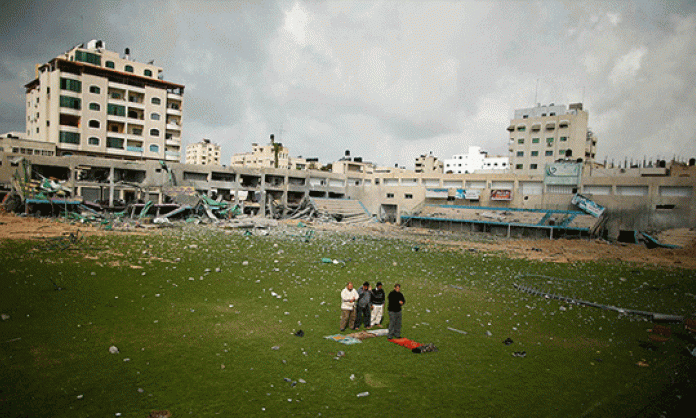If you have been following the World Cup, you won’t have seen the Palestinian national football team. But don’t fret. The team won its first qualifying match for the Asian World Cup last month, and will be down under to play against Japan, Jordan and Iraq in Melbourne next January – that is, if the Israeli apartheid state will let it.
For some international stars, football is a lucrative business. Portuguese captain and Real Madrid star Cristiano Ronaldo earned $77 million last year, thanks to deals with Nike, Samsung, Tag Heuer and Emirates. But for Palestinian players, who hail from the West Bank, Gaza and the Palestinian diaspora, football is a dangerous game.
Take, for example, Adam Abd al-Raouf Halabiya and his cousin Jawhar Nasser Jawhar. Last January, the two young players, aged 17 and 19, were shot by Israeli soldiers as they walked home from a training session at the Faisal al-Husseini Stadium in al-Ram, in the occupied West Bank.
The pair were set upon by guard dogs, dragged across the ground and beaten by the soldiers. According to medical reports, Jawhar was shot with 11 bullets: seven in his left foot, three in his right and one in his left hand. Halabiya was shot in each foot and had his leg broken. After receiving treatment in Jordan, they were arrested by the Israeli authorities on their return home, accused of carrying a bomb.
Both have been held in detention ever since and are awaiting trial. Neither will ever play football again.
In January 2009, three Palestinian soccer players – Ayman Alkurd, Shadi Sbakhe and Wajeh Moshtahe – were killed during Israel’s Operation Cast Lead in Gaza. In March, 18-year-old footballer Saji Darwish was shot dead by an Israeli sniper next to the Beitin checkpoint near Ramallah. An Israeli military spokeswoman claimed he was throwing stones.
Several Palestinian players have also been detained by Israeli occupation forces. In July 2009, six months into his Palestinian national football team career, Mahmoud Sarsak was administratively detained (without charge) by Israeli border police. He spent three years behind bars and was released only after a 90-day hunger strike and an international solidarity campaign.
In 2012, Olympic team goalkeeper Omar Abu Ruways was arrested, allegedly for being a member of a terrorist cell. Another player, Samah Fares Muhamed Marava, was arrested last April after returning with his team from training in Qatar. The Shin Bet (Israeli intelligence) accused Marava of exploiting his status as a Palestinian football player to act as a courier for Hamas.
Palestinian players living under occupation are routinely denied permission to travel for training or international competition. In October 2007, the team was denied exit visas to contest a crucial qualifier match for the 2010 World Cup. Despite protests, the game was not rescheduled, and FIFA deemed the team to have forfeited the game.
The Palestine football stadium in Gaza city was bombed in April 2006 and again in November 2012. It’s anyone’s guess whether it will spared in the current Israeli bombing campaign.
Last February, Palestinian Football Association chairman Jibril al-Rajoub told Ma’an News, “Israeli brutality [towards Palestinian players] emphasises the occupation’s insistence on destroying Palestinian sport.” Rajoub called for the Israel Football Association to be expelled from FIFA, a call ignored by FIFA’s June congress.
If the Palestinian team makes it to Melbourne next January, be there to show your support. In the meantime, let’s give occupied Palestine all the solidarity we can.




